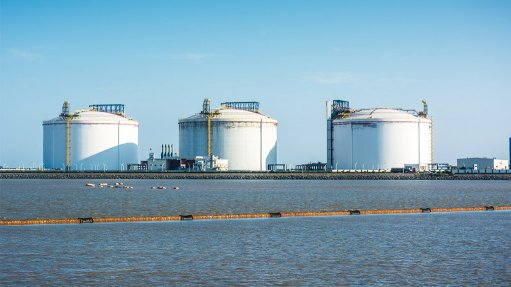Looming air-quality standards facing industry
Critical deadlines for the National Environmental Management: Air Quality Act (NEM: AQA) No. 39 of 2004 have either passed or are looming for activities listed under Section 21 of the Act and operators need to be aware of and meet the remaining deadline by handing in their licence applications or applications for postponement or exemptions from compliance with new emissions standards that will come into effect on April 1, 2015 and a further reduction of emissions levels as of April 1, 2020.
This is according to consulting engineers and scientists SRK Consulting’s Durban-based principal environmental geochemist and director Vis Reddy.
The consequences of missing these deadlines include fines, imprisonment and damage to the reputation of the responsible individuals and companies.
Section 21 of the NEM: AQA lists the activities that result in atmospheric emissions which have or may have a significant detrimental effect on the environment, including health, social, and ecological conditions or cultural heritage.
Reddy says emitters need to be aware of two aspects.
As of April 1, 2013, all operators with existing activities that are categorised as Section 21 activities should have applied for an air emissions licence if they were not licensed under the previous legislation, the Atmospheric Pollution Prevention Act No 45 of 1965.
If companies held air registration certificates for operations that discharge emissions in the atmosphere under the previous Act, they are required to apply for the air emissions licence under the new Act.
“If an operator of a Section 21 activity has not applied for that licence, the impli- cation of that is a breach of the law. However, if they have applied for the air emissions licence, they will be able to operate under the old licence or certificate until March 31, 2014. Hopefully, by then, local government, which is the licensing authority, will issue them with an air emissions licence to continue operating,” Reddy explains.
New National Ambient Air Quality standards come into effect on January 1, 2015, and there will be a limited period during which to comply.
Reddy says the priority air pollutants are sulphur dioxide (SO2), nitrogen dioxide (NO2), lead, benzene, carbon monoxide, ozone and particulate matter (PM10).
The yearly ambient standards for SO2, NO2 and lead are 50 µg/m3, 40 µg/m3 and 0.5 µg/m3 respectively, effective immediately, according to the Department of Environmental Affairs.
The yearly ambient standard for benzene is 10 µg/m3 and the compliance date is December 31, 2014, after which the standard will be reduced to 5 µg/m3 on January 1, 2015.
The daily or 24 ambient standard for PM10 is 120 µg/m3 until December 31, 2014. It will be reduced to 75 µg/m3 on January 1, 2015, while the limit for yearly emissions will be reduced from 50 µg/m3 to 40 µg/m3 simultaneously.
The eight hour standards for ozone and carbon monoxide are 120 µg/m3 and 10 mg/m3 respectively.
Reddy says government has been passing regulations governing air quality and this places an onus on emitters of air pollution to control their emissions.
“Although compliance may not take place in some cases, many of SRK’s clients do want to comply. Some clients are not able to comply as most operators’ plants were established about 30 to 40 years ago. It is costly and in some cases impractical to retrofit some of the plants, as companies want to continue operating and cannot afford to shut down,” he states.
As and when maintenance is required, or when the life of the installed plant and equipment comes to an end, operators can decide how to retrofit their equipment and install the technology needed to become compliant.
Legislation Quality
Reddy believes that South Africa’s air quality legislation is on par with that of current international standards, adding that, although South Africa’s air quality legislation is fairly new – many of the regulations and standards only came into effect after 2009 – so the authorities that compiled these guidelines have reviewed and incorporated global best practices.
He says South Africa’s legislative guidelines relating to air quality are in line with the World Health Organisation and US Environmental Protection Agency standards and, in many cases, the country’s air quality legislation is more stringent than that of other countries, whether, developing or undeveloped.
Reddy notes that in the early 1990s there was no urgency regarding air pollution and controlling emissions was not a priority. However, companies have become more environmentally aware and have corporate responsibilities and, as a result, many companies have drawn up environmental policies.
“Many companies are signatories to various conventions and there are many push factors that urge companies to adopt good air quality management processes. Nongovernmental organisa- tions also play a major role in creating awareness about air quality concerns, highlighting the health and environmental impacts associated with poor air quality,” he says.
While South Africa’s legislation is compatible with international norms and standards, the country’s focus area should be on ensuring that companies are compliant, adds Reddy.
However, governmental authorities need to be proactive and support the processes that enable compliance. Reddy says faster turnaround times are needed from governmental authorities in terms of responding to, making decisions on and advising emitters or operators about these processes, as companies have expressed significant frustration regarding slow turnaround times.
He highlights that authorities’ technical knowledge also needs to be improved to facilitate faster decision-making.
Emission Control
Reddy suggests that the use of raw materials, such crude oil and coal, be reduced and says companies should focus on using gas instead, as there is a significant amount of gas available to South Africa, owing to the Mozambique pipeline.
“However, where operators can’t incor- porate gas, they could retrofit their faci- lities to control emissions before they are released into the atmosphere. Some companies can consider cogeneration, as they generate a lot of heat from pro- cesses and, instead of discharging that heat, it can be used for power generation,” he explains.
He points out that opportunities exist in many operations and in KwaZulu- Natal the sugar milling industry seems to be leading the pack in terms of cogene- ration and the use of biomass, which would usually be disposed of as waste.
Renewable-energy sources, such as solar and wind-generated power, to supplement on-site electricity needs, should also be considered to reduce emissions, Reddy says.
Comments
Press Office
Announcements
What's On
Subscribe to improve your user experience...
Option 1 (equivalent of R125 a month):
Receive a weekly copy of Creamer Media's Engineering News & Mining Weekly magazine
(print copy for those in South Africa and e-magazine for those outside of South Africa)
Receive daily email newsletters
Access to full search results
Access archive of magazine back copies
Access to Projects in Progress
Access to ONE Research Report of your choice in PDF format
Option 2 (equivalent of R375 a month):
All benefits from Option 1
PLUS
Access to Creamer Media's Research Channel Africa for ALL Research Reports, in PDF format, on various industrial and mining sectors
including Electricity; Water; Energy Transition; Hydrogen; Roads, Rail and Ports; Coal; Gold; Platinum; Battery Metals; etc.
Already a subscriber?
Forgotten your password?
Receive weekly copy of Creamer Media's Engineering News & Mining Weekly magazine (print copy for those in South Africa and e-magazine for those outside of South Africa)
➕
Recieve daily email newsletters
➕
Access to full search results
➕
Access archive of magazine back copies
➕
Access to Projects in Progress
➕
Access to ONE Research Report of your choice in PDF format
RESEARCH CHANNEL AFRICA
R4500 (equivalent of R375 a month)
SUBSCRIBEAll benefits from Option 1
➕
Access to Creamer Media's Research Channel Africa for ALL Research Reports on various industrial and mining sectors, in PDF format, including on:
Electricity
➕
Water
➕
Energy Transition
➕
Hydrogen
➕
Roads, Rail and Ports
➕
Coal
➕
Gold
➕
Platinum
➕
Battery Metals
➕
etc.
Receive all benefits from Option 1 or Option 2 delivered to numerous people at your company
➕
Multiple User names and Passwords for simultaneous log-ins
➕
Intranet integration access to all in your organisation


















